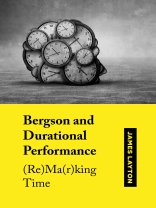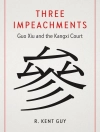Humans have always marked time, whether by using the earth’s natural rhythms or with the clock. Unlike pre- industrial people, living in an age of social acceleration is dominated by clock-time and network time, presenting many more options than can possibly be achieved in a human lifespan.
This book explores the possibility of an alternative experience of time, one that is closer to the pure duration described by philosopher Henri Bergson. The discussions in this book contribute to contemporary performance analysis, philosophy and Bergson studies as well as exploring aspects of immersive and participatory performance, walking practices, ritual and online performance.
Using durational performances as case studies, the author demonstrates new insights into Bergson’s philosophy alongside key theorists in psychology and anthropology. Through a series of performance analyses, Bergson’s philosophy of duration is coupled with ideas from Maslow, Csikszentmihalyi and Victor Turner to speculate on the possibilities available in challenging an experience of the world in which time is short, but the possibility of experience is abundant.
The main audience is an academic and student market. Undergraduate and postgraduate students of theatre studies, performance and the performing arts, doctoral researchers, researchers interested in time and performance, the relationship between performance and philosophy, those with an interest in philosophy, sociology, anthropology, and psychology will all find much of interest.
Potential wider readership in those who are interested in the phenomenon of social acceleration, in performance philosophy as well in Bergson’s philosophy.
Table des matières
List of Figures
Prologue: 15 April 1912
Introduction
PART ONE
1. Bergson, Pure Memory and Pure Duration
2. Bergson and Durational Performance: Duration, Immersion, Participation, Ritual
3. Durational Performance in a Socially Accelerated Culture: Clock-Time + Network Time = No Time
4. Durational Performance as a Challenge to Smooth Consumption
PART TWO
5. Peak Time: Bergson and Maslow
6. Flow Time: Bergson and Csikszentmihalyi
7. Time Together: Bergson and Turner
8. Hotel Medea: Memory, Duration and Peak-Experience in an Accelerated Culture
9. All These Are the Days My Friends: Duration and Flow in Einstein on the Beach
10. Walking, Communitas, Ritual and Transformation
11. Marking, Making, Remarking, Remaking Time: Bergson and the Future of Durational Performance
Epilogue: A Manifesto for Durational Performance
Postscript: Arriving at the Crack of Dawn for a Plagueground Game Show
Bibliography
Index
A propos de l’auteur
Dr James Layton is a lecturer in performance at the University of the West of Scotland. His current research examines drama in applied contexts, specifically how drama can be used a tool for change within communities. He is also currently involved in a project in Romania exploring drama in the school curriculum. Other research concerns durational performance in relation to the philosophy of Henri Bergson.












